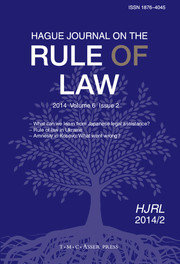Article contents
Access to Justice and Legal Pluralism in Fragile States: The Case of Women's Rights
Published online by Cambridge University Press: 12 October 2012
Extract
Perhaps the most significant trend in justice reform efforts in the last decade in fragile states and developing societies has been a growing interest in informal justice systems. This trend is partially in response to the poor track record of interventions aimed at transforming formal justice institutions into well-functioning systems that meet the ideals of Western rule of law. It also reflects an effort to accommodate what is now recognized as an empirical fact – in many societies, informal justice systems are the primary locus of dispute resolution for the vast majority of the population, and therefore cannot be ignored. However, the rhetorical recognition of the importance of informal systems has far outpaced change in strategies or even programming. There are several reasons for this, but the biggest challenge is a normative one. International actors regard the alternative paradigms of justice offered by local communities as desirable only to the extent that they offer accessible and restorative remedies in ways that do not contravene international standards of rule of law and human rights. Here, the recognized advantages tend to be outweighed in the minds of many development actors by the perceived failure of informal systems to comply with these norms – especially when it comes to women's rights.
The dilemma this poses has resulted in two primary approaches. The first assumes that informal systems are inherently and irremediably inconsistent with women's rights and therefore the formal system must be the primary, if not sole, forum for adjudicating disputes involving women. The second approach seeks to engage with informal systems with the aim of transforming them to comply with international standards, while retaining the positive features of accessibility, familiarity and effectiveness. This note note discusses and analyses the limitation of these two approaches. Ultimately, it is argued here, they are flawed.
This note presents an alternative way of problematizing women's access to justice and corresponding ways of addressing the inequality. Rather than focus on selecting, promoting or changing the formal or informal justice system, intervenors need to embrace processes of social change as the means for instituting legal change.
Keywords
- Type
- Notes
- Information
- Copyright
- Copyright © T.M.C. Asser Press and the Authors 2012
- 15
- Cited by




